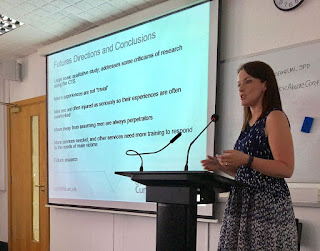Learning together and working together: how students and prisoners can work together to find new ways of understanding.
 |
| Dr Alison Spurgeon-Dickson JP |
As part of a University of Cumbria and HMP Haverigg experiential
learning collaboration we developed and successfully delivered a level 6 module
in psychology, worth 20 credits for our students and prisoner students at Cumbria’s
only prison.
The way in which we worked together was truly innovative because of how
the module content was delivered. Not only did it
include typical theoretical discussion and debates on criminology and forensic
psychology, it also drew from wider university disciplines and preeminent
public figures involved in the local judiciary and criminal justice systems,
giving both sets of students an enhanced level of understanding. Interactive
dialogue was another unique element of the module and formed the basis of
students’ learning. They worked together and learnt from one another on
an equal footing, which was highly valued by both
sets of learners alike.
“good to have discussions with external
speakers and the opportunity to put your perspective forward – and it is good
to know that outsiders are prepared to help”
 |
| UoC and Haverigg students |
How was it
rolled out?
During 2015-16 university students and prisoners submitted applications
and induction days were held in the prison for the students to meet and build
mutual trust.
As an example of the unique collaborative approach, a local
judge led on a group discussion on courtroom psychology in the prison. Students
met the judge on equal terms, and demonstrated through confident discussion and
interaction with their peers, the transforming capacity of higher education.
What were
the results
All students passed
at 2:1 or above and prisoners gained 20 credits towards higher education on
their release. For prisoner learners, it gave them an
alternative perspective on their experiences, increased their
employability thereby significantly reducing their risk of re-offending upon
leaving prison. They learnt by being connected to a wider community of learners
where solitary distance learning is usually the only option for those wishing
to gain an education. University students gained invaluable insight into the
lived experience of prison and the criminal justice system and gave students across our campus, who would never normally get
the opportunity, to work in a prison setting.
“The
program has provided me with enriched experiences and knowledge via the most
healthy and supportive environment. It has helped me cooperate with others from
completely different life experiences and culminate these experiences with my
own to create useful and insight work which is invaluable progressing into the
future”.
 |
| UoC and Haverigg students |
What
next?
This way of collaborative working is highly transferable and
as a result, we are developing a suite of programmes to include additional
modules in psychology, thereby offering more experiential learning and
development opportunities at more levels.
Dr Alison Spurgeon-Dickson JP is one of our senior lecturers. If you'd like to contact her then please email her on: alison.spurgeon-dickson@cumbria.ac.uk


Comments
Post a Comment